History gets a reality check
Historical interpreters highlight untold Black history

Local living history organization History at Play has partnered with historical interpreter Cheyney McKnight to delve into the untold stories of enslaved people in the 18th century. On March 12 at 7:30 p.m., “Not Your Momma’s History: The Life of an Enslaved Lady’s Maid” streams live on Zoom.
Boston area historical interpreter Judith Kalaora founded History at Play 11 years ago to tell the untold stories of history. Her first show told the story of Deborah Sampson, a Sharon, Massachusetts native who disguised herself as a man to fight in the Revolutionary War. Since then, she’s highlighted many behind-the-scenes women whose hard work and courage have been buried over time. As Kalaora’s business and the public appetite for history grew, she expanded her team and program partnerships to tell stories of people of color in history. “I realized that I was limited, and I didn’t want history to be limited,” Kalaora says.
The upcoming program is the result of one such partnership. McKnight has been doing similar historical interpretation work, specifically telling stories of Black American life. She’s been formally running Not Your Momma’s History for five years, consulting with museums and running public programs. “If there weren’t Black Americans, there would be no United States of America,” she says. “You cannot tell the story of America without telling the story of Black folks here in this country.”
Typically, HAP performances have an actor embodying the historical character. Actors study the figure and their world extensively in order to live the role to the point where they can answer questions as the historical figure at the end-of-show Q&A. “The Life of an Enslaved Lady’s Maid” will be a little different than History at Play’s typical programming, in that it will be more of a lecture format.
McKnight, who has lectured often about enslaved people in field and kitchen work and wanted to showcase a different experience in this program, says, “There was such diversity in clothing, in jobs … I hope that people get a more well-rounded view of slavery in America.”
History at Play puts on living history performances every second and fourth Friday of the month on a pay-what-you-can basis. Not Your Momma’s History runs an active YouTube channel delving into Black history and regularly runs programs like this one.
It’s a unique time in the historical world. Black Lives Matter protests throughout 2020 spurred many organizations to rethink historical interpretations that leave out the Black experience. As sites and museums scramble to rebalance the scales, historical interpreters have increased opportunities to tell long overlooked diverse stories. “I woke up in August and my email was flooded with historical sites trying to catch up,” says McKnight. “A lot of people are starting to, overnight, try to change their entire interpretation.”









